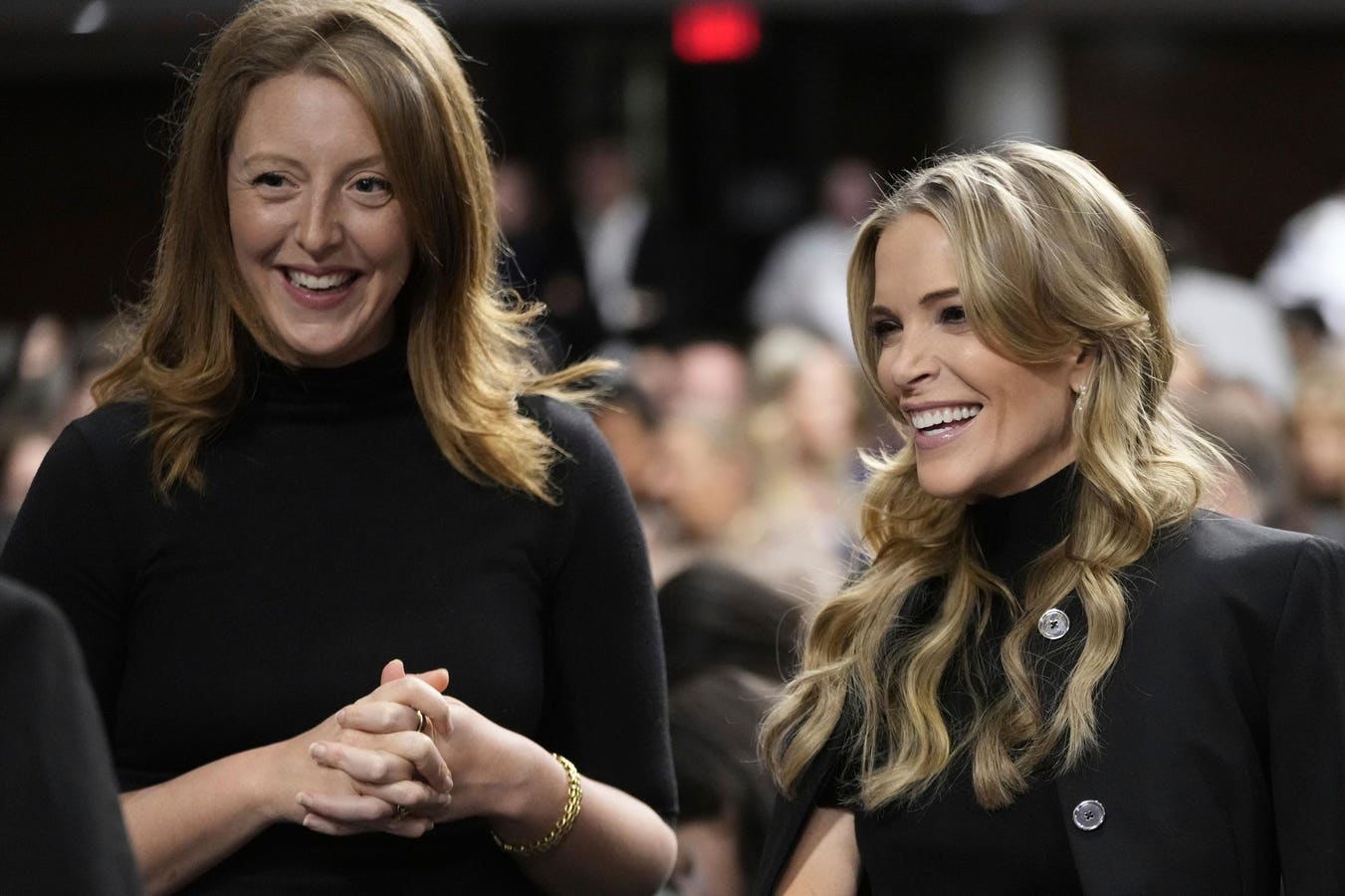Dr. Casey Means, a wellness influencer, left, and journalist Megyn Kelly, right, attend a Senate … More
Last week, President Donald Trump withdrew his nomination of Dr. Jennifer Nesheiwat to be the Surgeon General of the United States. Instead, he nominated Dr. Casey Means, a 37-year-old wellness influencer with close ties to Health and Human Services Secretary Robert F. Kennedy Jr. Although she holds a medical degree from a respected institution, other aspects of Casey Means’ brief career make her an odd choice to serve as “the nation’s doctor.”
What Prompted Trump to Switch Nominees?
Trump’s first nominee, Dr. Nesheiwat, also raised eyebrows. A medical director with an urgent care company in New York City and regular contributor to Fox News, she is the sister-in-law of former National Security Advisor Mike Waltz.
Late last month, independent journalist Anthony Clark disclosed that Nesheiwat earned her medical degree from a Caribbean medical school, not the University of Arkansas as she’d previously claimed. It’s not clear, however, that this sank her nomination.
Early last week, Laura Loomer, a far-right figure who has scuttled other Trump appointees, posted on X that “we can’t have a pro-COVID vaccine nepo appointee who is currently embroiled in a medical malpractice case and who didn’t go to medical school in the US” as surgeon general, according to the Washington Post. Trump’s announcement came mid-week.
What Do We Know About Casey Means?
After announcing the switch, Trump went to Truth Social to praise Casey Means’ “impeccable ‘MAHA’ credentials”. Noting that “Her academic achievements, together with her life’s work, are absolutely outstanding, he declared, “Dr. Casey Means has the potential to be one of the finest Surgeon Generals in United States History.”
How well does Trump’s depiction align with what is known about Casey Means?
On the plus side, she graduated with honors from Stanford University with a bachelor’s degree in human biology. After earning her medical degree from the Stanford School of Medicine in 2014, she entered residency training in Ear, Nose and Throat Surgery at the Oregon Health & Science University in Portland.
What follows is more concerning. In her final year of residency training, she withdrew from the program and recast herself as a “functional medicine doctor, focused on holistic approaches to care,” according to StatNews. Her Oregon medical license lapsed that year. Then, she co-founded Levels, a company that promotes continuous glucose monitoring (CGM) for healthy people. CGM is useful in managing patients with diabetes, but there’s no evidence that this costly technology does healthy patients any good. She also touts supplements and other health-related products in her email newsletter and social media, according to the Wall Street Journal. Her website states, “I am a medical doctor, writer, tech entrepreneur, and aspiring regenerative gardener who lives in a state of awe for the miracle of existence and consciousness.”
What’s clear, however, are her MAHA credentials. She and her brother, Calley Means, published a book entitled “Good Energy: The Surprising Connection Between Metabolism and Limitless Health.” Soon thereafter, she did podcasts with Tucker Carlson and Joe Rogan. After that, she and her brother worked as advisers to RFK, Jr’s presidential campaign and supported his nomination to lead HHS.
U.S. Secretary of Health and Human Services Robert F. Kennedy Jr. speaks at a recent news … More
She shares Mr. Kennedy’s disdain for big food companies and the pharmaceutical industry, and questions the vaccine schedule for children. In an interview with Bill Mahler, she said, “When it comes to a question like raw milk, I want to be free to form a relationship with a local farmer, understand his integrity, look him in the eyes, pet his cow, and then decide if I feel safe to drink the milk from his farm” according to The Wall Street Journal.
What Does “The Nation’s Doctor” Do?
The Surgeon General is responsible for giving Americans the best scientific information available on improving their health and reducing their risk of illness and injury. Appointed by the President, with the advice and consent of the Senate, they serve a 4-year, renewable term. Although the Surgeon General’s small staff nominally oversees the 6,000-member Commissioned Corps of the U.S. Public Health Service, the Corps’ members are primarily supervised through the agencies where they are posted.
From 1870 until the mid-1960s, U.S. Surgeon General nominees were selected from the senior ranks of the Commissioned Corps. This process is still followed by the Army, Navy and Air Force to nominate their Surgeons General.
The public probably learned of the Surgeon General for the first time with the release of the Surgeon General’s Report on Smoking and Health in 1964. It thrust Surgeon General Luther Terry into the spotlight and led Congress to compel cigarette manufacturers to place the now-famous “Surgeon General’s warning” on cigarette packages.
Dr. C. Everett Koop defined the role of the modern Surgeon General as “the nation’s doctor” when he was confirmed in 1982. Contrary to the predictions of those who opposed his nomination, Koop based his positions on science, rather than partisan politics or personal religious views. For example, he produced a report stating that nicotine has similar addictive power to heroin or cocaine and expanded the list of warnings on cigarette packages. He declined to state that abortions performed by qualified medical professionals pose a substantial health risk to women. Recognizing the magnitude of the AIDS threat, he directed that objective information about AIDS be mailed to every household in the country. By the time he retired in 1989, he had earned widespread recognition and respect.
Former Surgeons General C. Everett Koop (L), Richard Carmona (C) and David Satcher testify before … More
Growing Political Interference
Wary of Dr. Koop’s independence, subsequent administrations sought to rein in their Surgeons General. In 2007, the House Committee on Oversight and Government Reform held a landmark hearing on “the Surgeon General’s Vital Mission.” It featured Dr. Koop, Dr. David Satcher, who held the role after leading the CDC, and Dr. Richard Carmona, who released a landmark Surgeon General’s report on the health effects of secondhand smoke. Unlike Dr. Koop, who testified that President Reagan and HHS Secretary Otis Bowen ensured his independence, Drs. Satcher and Carmona described increasingly challenging interactions with subsequent Republican and Democratic administrations. The views of all three men were encapsulated in a statement by Dr. Carmona. “The job of surgeon general,” he said, “is to be the doctor of the nation, not the doctor of a political party.”
This Brings Us Back To The Current Nominee
By nominating Dr. Means, Trump has signaled that neither a medical license nor relevant clinical and public health experience is required to serve as Surgeon General in his administration. If recent history is any guide, Republican Senators will agree. Whether the public will give her reports and remarks the same credence as those of prior Surgeons General is less clear.
Her road to confirmation may not be easy. Laura Loomer has come out against Means. So has Nicole Shanahan, RFK Jr’s former running mate. Some MAHA supporters don’t think she’s anti-vaccine enough. Conversely, science-based advocacy groups consider her unqualified for the role.
Her patron, RFK Jr., is standing firm. “The attacks that Casey is unqualified because she left the medical system completely miss the point of what we are trying to accomplish with MAHA,” Kennedy posted late last week; “Casey is the perfect choice for Surgeon General precisely because she left the traditional medical system—not in spite of it.”








